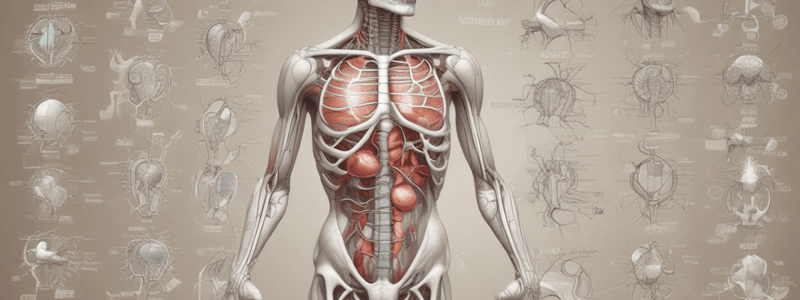Podcast
Questions and Answers
What is the primary focus of the medical industry?
What is the primary focus of the medical industry?
What is the importance of examining signs and symptoms in patients?
What is the importance of examining signs and symptoms in patients?
What is the result of abnormalities in tissues, organs, or systems?
What is the result of abnormalities in tissues, organs, or systems?
What is the role of control mechanisms in the body?
What is the role of control mechanisms in the body?
Signup and view all the answers
What is the relationship between body systems?
What is the relationship between body systems?
Signup and view all the answers
What is the importance of understanding the hierarchy of the human body?
What is the importance of understanding the hierarchy of the human body?
Signup and view all the answers
What is the result of changes in chemicals, analytes, and substances in the body?
What is the result of changes in chemicals, analytes, and substances in the body?
Signup and view all the answers
What is the key to understanding the human body?
What is the key to understanding the human body?
Signup and view all the answers
Study Notes
Importance of Foundational Knowledge in A&P
- Students in Phlebotomy and/or MLA courses require a solid understanding of the human body as a whole and its individual components.
- The human body is a complex organism that relies on the interaction of multiple processes to function properly.
Body Functions and Control Mechanisms
- The body's proper functioning involves the production, cessation, increase, decrease, and variations of chemicals, hormones, analytes, and water.
- These processes are regulated by control mechanisms that are influenced by factors such as sex, age, time of month, and time of day.
Interconnecting Systems
- The body is a complex final product of many interconnecting systems that are under varying levels of control and expression throughout an individual's life.
- Understanding these systems is crucial in the medical industry to identify normal function, pathologies, and corrective interventions.
Hierarchy of the Human Body
- The human body is organized in a hierarchical structure, comprising cells, tissues, organs, and body systems.
- Each body system has different organs, tissues, and cells that work together to maintain normal operations and functions.
Body Systems and Pathologies
- The examination of signs and symptoms by clinicians is essential in identifying abnormalities in patients.
- Pathologies often present with changes in structure, function, and general operations of tissues, organs, or systems as a whole.
- These changes can also cause alterations in chemicals, analytes, and substances.
Studying That Suits You
Use AI to generate personalized quizzes and flashcards to suit your learning preferences.
Description
This quiz covers the basics of human anatomy and physiology, including the body's systems and processes. It is essential knowledge for students in Phlebotomy, MLA, and other health-related courses. Understanding how the body functions as a whole is crucial for success in these fields.




